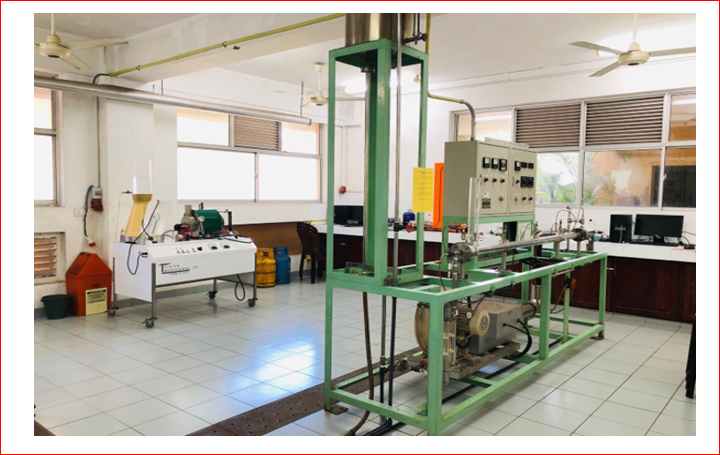Laboratory Test Request Form
The Transport Phenomena Laboratory has been developed as an undergraduate teaching laboratory. It is dedicated to providing undergraduate students with hands-on experiences to understand the fundamental concepts of heat, mass, and momentum transport. The main focus is to demonstrate the fundamental concepts in heat, mass, and momentum transport. The focus is on fostering a deep understanding of these crucial principles, preparing students for real-world applications in engineering and beyond.

Focus Areas:
At the heart of the laboratory are three key areas:
Heat Transfer: Explore the intricacies of heat transfer mechanisms, from conduction to convection and radiation. Gain practical insights through firsthand experiments.
Mass Transfer: Investigate gaseous and liquid diffusion coefficients to understand how materials and substances move through different mediums.
Momentum Transfer: Understand the significance of momentum transfer in engineering and physics. Conduct experiments using equipment like the FM 50 Centrifugal Pump to comprehend operational characteristics.
Equipment List
The laboratory is equipped with the following tools and apparatus.
FM 50 Centrifugal Pump
Students can gain valuable insights into the understanding of the operational characteristics of pumps under various conditions through experiments. By altering parameters such as impeller speed, they uncover the pump's behavior across different scenarios. This exploration helps students form connections between theoretical knowledge and real-world applications, enhancing their understanding of fluid dynamics in engineering contexts.
Rankine Cycler
Rankine cycle is a vapor power cycle which is widely used in power generation. This equipment enables students to delve into the intricacies of the Rankine cycle, a vital process widely used in power generation across the globe. Through hands-on experiments, students gain a profound understanding of the principles underpinning steam-based electricity generation. Here aims are to identify and investigate the component generating electricity using steam, and overall efficiency of a Rankine cycle.
Gaseous Diffusion Coefficients Apparatus
The Gaseous Diffusion Coefficients Apparatus opens a window into the world of molecular movements. Diffusion, a fundamental process in nature, governs how gases disperse through various mediums. This advanced apparatus allows students to unravel the intricacies of gaseous diffusion, supplying a unique opportunity to study the behavior of molecules in different environments. Diffusion coefficients of a gas by evaporation from a liquid surface can be found by this apparatus.
Liquid Diffusion Coefficients Apparatus
The Liquid Diffusion Coefficients Apparatus is a gateway to understanding the diffusion of molecules in different concentrations of solute. Diffusion in liquids is a fundamental process, governing how substances disperse and mix. This advanced apparatus allows students to explore the nuances of liquid diffusion, supplying an immersive experience in studying molecular mobility. In practice two differing concentrations of solute whose diffusion coefficient is to be found.
Fixed bed Absorber
The Fixed Bed Absorber allows study on selective adsorption. This apparatus is designed to explore the breakthrough time and the length of the unused bed in a fixed bed absorber setup. It serves as a vital tool for understanding how specific substances can be selectively removed from solutions through the use of solid adsorbents.
Laboratory Staff / Contact us
- Lab In Charge : Prof. A.D.U.S. Amarasinghe(adusa2@uom.lk)
- Technical officers : Mr. H.P. Mahendra (padmalalm@uom.lk)
- Boiler Operator : Mr. BARD Abeywardana
- Lab Attendant : Mr. Viranga Somarathna
